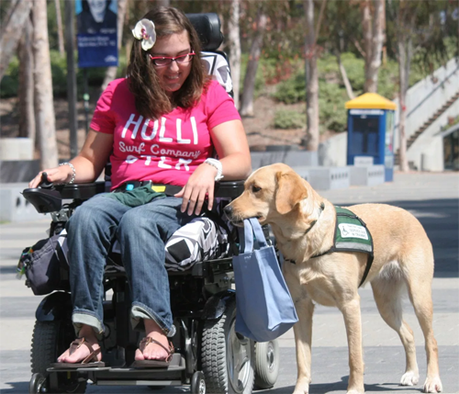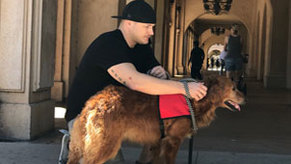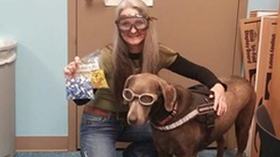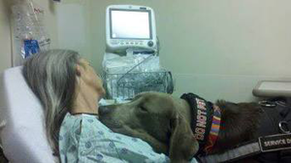SERVICE DOGS
|
Service dogs are protected by both Federal and State Laws. According to the Department of Justice, Americans with Disabilities Act (ADA) a service animal is defined as any DOG that is individually trained to do work or perform tasks for the benefit of an individual with a disability, including a physical, sensory, psychiatric, intellectual or other mental disability. The work or tasks performed by the dog must mitigate and be directly related to the handler’s disability. In March, 2011, revisions to the ADA excluded all animals but dogs (and miniature horses in special provisions) as service animals.
The ADA’s definition states “Service animals are defined as dogs that are individually trained to do work or perform tasks for people with disabilities. Examples of such work or tasks include guiding people who are blind, alerting people who are deaf, pulling a wheelchair, alerting and protecting a person who is having a seizure, reminding a person with mental illness to take prescribed medications, calming a person with Post Traumatic Stress Disorder (PTSD) during an anxiety attack, or performing other duties.” |
Service animals are working animals, not pets. The work or task a dog has been trained to provide must be directly related to the person’s disability. Dogs whose sole function is to provide comfort or emotional support do not qualify as service animals under the ADA.”
They require a great deal of specialized training to learn tasks that will mitigate their handler’s disability such as obstacle avoidance for those with sight impairments, alerting to sounds for those with hearing impairments, retrieving dropped items for those with mobility impairments, alerting to an oncoming anxiety attack for those with PTSD or a myriad of other tasks which are outlined at http://www.iaadp.org/tasks.html
These dogs have legally defined public access rights, which means they are allowed to accompany their disabled handler in all areas where members of the public are allowed to go. Additional information on this law can be found at this link https://www.ada.gov/service_animals_2010.html.
Service Dogs may travel and live with their disabled handler free of charge and it is illegal for places of business or for public accommodations to deny a team access.
They require a great deal of specialized training to learn tasks that will mitigate their handler’s disability such as obstacle avoidance for those with sight impairments, alerting to sounds for those with hearing impairments, retrieving dropped items for those with mobility impairments, alerting to an oncoming anxiety attack for those with PTSD or a myriad of other tasks which are outlined at http://www.iaadp.org/tasks.html
These dogs have legally defined public access rights, which means they are allowed to accompany their disabled handler in all areas where members of the public are allowed to go. Additional information on this law can be found at this link https://www.ada.gov/service_animals_2010.html.
Service Dogs may travel and live with their disabled handler free of charge and it is illegal for places of business or for public accommodations to deny a team access.
Federal law states: “When it is not obvious what service an animal provides, only limited inquiries are allowed. Staff (or members of the public) may ask two questions: (1) is the dog a service animal required because of a disability, and (2) what work or task has the dog been trained to perform. Staff cannot ask about the person’s disability, require medical documentation, require a special identification card or training documentation for the dog, or ask that the dog demonstrate its ability to perform the work or task.”
Use the scroll bar below to read the ADA overview of Service Animals
Your browser does not support viewing this document. Click here to download the document.
This dog was trained by Paws'itive Teams, the same organization where Ricochet and Cori are
certified as a goal-directed therapy dog. Notice how the dog engages and makes eye contact with the handler.
certified as a goal-directed therapy dog. Notice how the dog engages and makes eye contact with the handler.
There is no such thing as "certification". Although some organizations that provide dogs will certify through their own organization. But, all those online websites that sell certifications are bogus and just making money off people. The only things that are needed, according to the ADA are your disability, and a dog that has been trained to perform at least two tasks to mitigate your disability. The dog isn't the one who had access rights, rather it's the individual with the disability & the dog as a team that have public access.
What are trained tasks?
Anything Pawsable describes a trained task as; a dog must execute a command (or behavior) promptly and on cue. Tasks are things that a dog is trained to do reliably — exactly like sitting or going into a down stay on command. Furthermore, the training must be verified by a qualitative and quantitative method (also known as proofing). Finally, and most importantly, the trained behavior in question must directly mitigate one or more aspects of the handler’s specific disability. The behavior of the dog must happen as a response to a specific command or be automatically cued by an external — but specific — factor such as scent (such as a verified sample of excretions from body during a high or low blood glucose level also known as hypoglycemia and hyperglycemia), emotion (such as a verified emotion of fear during a night terror), sound, motion, etc.
Anything Pawsable goes on to say; there are no other requirements (no documentation, no gear, no certification, no registration, no anything else), and it’s quite simple: if a dog is NOT task-trained, working directly for an individual with a disability and under the direct control of the handler, it is NOT a Service Dog.
Anything Pawsable goes on to say; there are no other requirements (no documentation, no gear, no certification, no registration, no anything else), and it’s quite simple: if a dog is NOT task-trained, working directly for an individual with a disability and under the direct control of the handler, it is NOT a Service Dog.
Can I train a dog myself?
From a legal stand point, you can. But it’s a risky proposition because you’ll be putting thousands of hours of training into it, and the dog may still not be appropriate. You also have to ask yourself if you have the skills to train a dog correctly. Or what will you do if your dog ends up with a medical problem. It’s hard to be objective about your own dog, so you may miss signs the dog gives you which clearly indicate he doesn’t want to be a working dog. Many dogs prefer to just stay home, rather than handle the stress of working out in public all the time.
Be honest with yourself, and be fair to your dog. If your dog reacts to other dogs, has triggers, or other behavior challenges, it’s best to let him be a pet dog rather than continuously try and make him into something he doesn’t want to be. It’s your responsibility to keep yourself, your dog, and the general public safe, so try not to make excuses for why your dog growls at other dogs that get too close to him. Just admit that your dog prefers to be alone with you indoors, or in an enclosed yard or play area. Many of these type pet dogs make excellent emotional support dogs.
If you still decide to train your own dog, don’t do it alone. Seek out the help of an experienced, credentialed dog trainer. They should have a background in training dogs for specific tasks, and be well versed in public access testing.
Be honest with yourself, and be fair to your dog. If your dog reacts to other dogs, has triggers, or other behavior challenges, it’s best to let him be a pet dog rather than continuously try and make him into something he doesn’t want to be. It’s your responsibility to keep yourself, your dog, and the general public safe, so try not to make excuses for why your dog growls at other dogs that get too close to him. Just admit that your dog prefers to be alone with you indoors, or in an enclosed yard or play area. Many of these type pet dogs make excellent emotional support dogs.
If you still decide to train your own dog, don’t do it alone. Seek out the help of an experienced, credentialed dog trainer. They should have a background in training dogs for specific tasks, and be well versed in public access testing.
Can any dog become a working dog?
No, not all dogs can. It takes a certain temperament and disposition. In addition, they go through highly specialized training and socialization. They also need to be structurally sound, healthy and free of allergies. At no time can they be reactive to other dogs, chase animals, show signs of fear, solicit attention from others, scrounge for food, or a myriad of other undesirable behaviors. They must ignore the day-to-day distractions that are part of their partner’s life.
Assistance Dogs International
Assistance Dogs International (ADI) has been setting standards for the assistance dog industry since 1987. ADI is a coalition of not for profit assistance dog organizations. The purpose of ADI is to improve the areas of training, placement, and utilization of assistance dogs, staff and volunteer education, as well as educating the public about assistance dogs, and advocating for the legal rights of people with disabilities partnered with assistance dogs.
ADI accredits programs, so there’s an advantage to starting your search with these organizations. They have all gone through the same process to get accredited and they all follow the same guidelines. You are less likely to find a non-reputable program if you go with an ADI organization. If nothing else, it will give you a baseline to compare other programs to. Click this link for a list of accredited programs http://www.assistancedogsinternational.org/location/north-america-adina/
ADI accredits programs, so there’s an advantage to starting your search with these organizations. They have all gone through the same process to get accredited and they all follow the same guidelines. You are less likely to find a non-reputable program if you go with an ADI organization. If nothing else, it will give you a baseline to compare other programs to. Click this link for a list of accredited programs http://www.assistancedogsinternational.org/location/north-america-adina/
Puppy Prodigies early training of puppies for service work
|
|
|
Our Executive Director, Judy Fridono has a degree in assistance dog training from Bergin University of Canine Studies. Judy founded Puppy Prodigies Neo-natal & Early Learning program, which is the non-profit Ricochet and Cori work through.
Fake dogs
One way to recognize a fake is someone that purchases a certification, registration or ID from an online company that does not train the dog, test the dog, or even see the dog. They do nothing to verify the dog's training or the owner's disability. All that is required is a form be filled out & payment be made. If you have a bonafied disability & an appropriately trained dog who mitigates your disability, you do not need a certificate, so don't be fooled by these companies. You can learn much more about how people impersonate their pet dog as a working dog or more about the companies who are providing these fake certificates at these links http://bit.ly/FakeServiceDogs and http://www.petsadviser.com/service-animal/fake-service-dogs/









